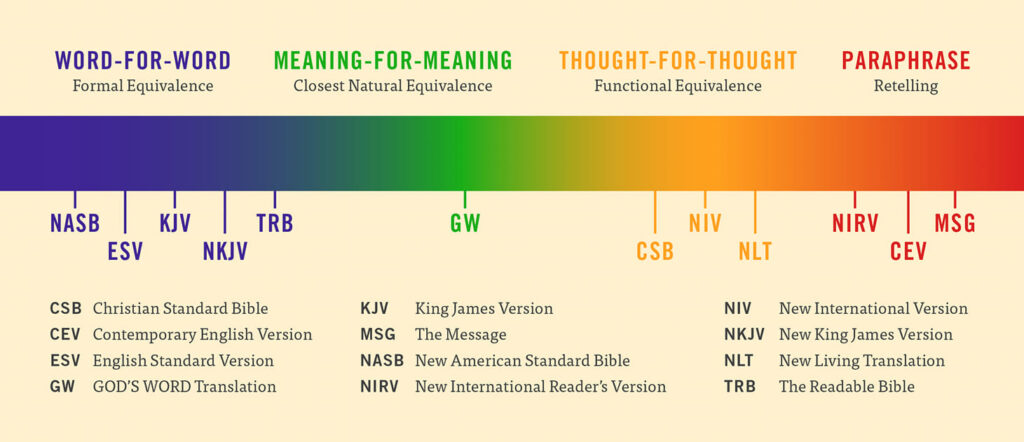
Origins of KJV-Only Believers
The KJV-Only Movement:

The King James Version (KJV) of the Bible has been a respected translation for centuries. However, the KJV-Only movement takes this respect to an extreme, asserting that the KJV is the only true and valid English translation of the Bible.
- Historical Roots: The KJV-Only movement has its origins in the early 20th century among various Protestant groups, particularly within fundamentalist and independent Baptist circles.
- Key Figures: Some prominent figures in the KJV-Only movement include:
- Benjamin G. Wilkinson: His book “Our Authorised Bible Vindicated” (1930) argued that the KJV was superior to all other translations.
- David Otis Fuller: His books, such as “Which Bible?” (1970), further popularised the KJV-Only stance.
- Peter Ruckman: A significant advocate for KJV-Onlyism, known for his staunch defence of the KJV and his belief in its inspiration.
Core Beliefs of KJV-Only Adherents
Beliefs:
- The KJV as the Only Legitimate Translation: KJV-Only adherents believe that the King James Version is the only true and accurate English translation of the Bible. They often claim it is divinely inspired and free from error.
- Rejection of Modern Translations: They argue that modern translations are corrupt and based on inferior manuscripts, believing these translations distort biblical truth.
Why KJV-Only Beliefs Are Not Biblical
1. The Bible Does Not Endorse Any Specific Translation:
- No Scriptural Basis: The Bible does not endorse any specific translation as the only legitimate one. The original texts were written in Hebrew, Aramaic, and Greek, and there is no biblical mandate specifying that the KJV or any other translation is uniquely authoritative.
2. The KJV Is a Translation Among Many:
- Translation History: The KJV, completed in 1611, was one of several English translations and was based on available manuscripts at the time. It is part of a long history of Bible translation efforts aimed at making Scripture accessible.
- Manuscript Evidence: Modern translations often use older and more reliable manuscripts discovered after the KJV was translated. This means that modern translations can be more accurate in some respects.
3. Translation Variability:
- Language Evolution: The English language has evolved significantly since 1611. Some words and phrases in the KJV are archaic and may be misunderstood by contemporary readers.
- Textual Criticism: Modern textual criticism, a scholarly discipline that examines and compares ancient manuscripts, helps ensure that translations are as close to the original texts as possible. This process is not inherently corrupt or malicious.
4. The Inspiration of Scripture:
- Original Texts: The doctrine of inspiration applies to the original manuscripts of the Bible, not to any specific translation. While translations aim to faithfully represent the original texts, they are the work of human translators.
Conclusion
The KJV-Only movement, while rooted in a desire to uphold the authority of Scripture, is not supported by biblical teaching. The belief that the KJV is the only legitimate translation is not founded on biblical principles but rather on historical and linguistic misunderstandings. The Bible itself does not prescribe any specific translation as uniquely authoritative, and modern translations benefit from advances in manuscript discovery and textual criticism, helping to convey the original biblical texts more accurately to contemporary readers. The KJV remains a valuable and historically significant translation, but it is not the only faithful representation of God’s Word.
The KJV-Only Movement: Elevating a Translation Above Jesus

The King James Version (KJV) of the Bible has been a respected translation for centuries. However, the KJV-Only movement takes this respect to an extreme, asserting that the KJV is the only true and valid English translation of the Bible.
This belief distorts the history of the Bible’s translation and places the KJV on a pedestal that even the original translators would likely reject. In doing so, the movement can inadvertently shift the focus from Jesus Christ, the true Word of God, to a particular Bible translation.
The KJV-Only Movement’s Misconceptions
- The KJV as the First English Bible Translation
The KJV was not the first English translation. It followed several others:
- Wycliffe’s Bible (1388)
- Tyndale’s Bible (1526)
- Coverdale’s Bible (1535)
- Matthew’s Bible (1537)
- Taverner’s Bible (1539)
- The Great Bible (1540)
- The Geneva Bible (1560)
- The Bishop’s Bible (1568)
- The Douay-Rheims Version (1609)
- The King James Version (1611)
- Divine Authorisation of the KJV
The KJV was authorised by King James I, not by God. The original title page states it was “appointed to be read in churches” by royal command, not divine decree.
- Literal Accuracy of the KJV
While the KJV is a generally literal translation, it occasionally uses paraphrases. For example, the Greek phrase “me genoito” (“may it never be”) is translated as “God forbid” in Luke 20:16 and Romans 3:4.
- Perfection of the KJV
No translation is perfect. Only the original manuscripts in Hebrew, Aramaic, and Greek are without error. The KJV itself has undergone several revisions to correct errors and update language.
- Superiority of the KJV Over Modern Versions
Modern translations are based on older and more reliable manuscripts than those available during the KJV translation. They also use contemporary language, making them easier to understand.
- Inspiration of the KJV Translators
The KJV translators did not claim divine inspiration. They acknowledged their work was not perfect and included notes on textual variants to indicate where they were unsure of the original text.
The KJV-Only Belief System
Origins and Core Beliefs:
- The KJV-Only movement gained traction in the 20th century, particularly among certain fundamentalist groups.
- Proponents like Benjamin G. Wilkinson, David Otis Fuller, and Peter Ruckman have argued that the KJV is the only valid English Bible.
Misplaced Reverence:
- KJV-Only believers often treat the KJV as if it is itself divinely inspired, rather than a faithful translation of the original scriptures.
- This can lead to the KJV being regarded almost as a member of the Trinity, replacing the centrality of Jesus Christ with a book.
Biblical Perspective on the Word of God
Jesus Christ as the Word of God
The Bible itself identifies Jesus Christ as the true Word of God. In John 1:1, it says, “In the beginning was the Word, and the Word was with God, and the Word was God.” Later, in John 1:14, it continues, “And the Word became flesh and dwelt among us.” These verses make it clear that Jesus is the living Word of God.
The Purpose of Scripture
2 Timothy 3:16-17 states, “All Scripture is God-breathed and is useful for teaching, rebuking, correcting and training in righteousness, so that the servant of God may be thoroughly equipped for every good work.” The purpose of Scripture is to reveal God and guide believers in their faith and practice. The KJV is one translation that accomplishes this, but it is not the only one.
Distortion by the KJV-Only Movement
By elevating the KJV to a status it does not claim for itself, the KJV-Only movement distorts the role of scripture. It shifts focus from the message to the medium, from Jesus to a specific translation of the Bible. This misplaced reverence can lead to a form of idolatry, where the KJV is treated as an object of worship rather than a tool to understand and worship God.
In Summery
Our loyalties are to the original manuscripts of the Old and New Testaments, written in Hebrew, Aramaic, and Greek. Only the original languages are the Word of God as He inspired it. A translation is only an attempt to take what is said in one language and communicate it in another. The modern translations are superb in taking the meaning of the original languages and communicating it in a way that we can understand in English. However, none of the modern translations are perfect. Every one contains verses that are at least somewhat mistranslated. By comparing and contrasting several different translations, it is often easier to get a good grasp on what the verse is saying than by only using one translation. Our loyalty should not be to any one English translation, but to the inspired, inerrant Word of God that is communicated by the Holy Spirit through the translations (2 Timothy 3:16-17).
Conclusion
The KJV is a valuable and historic translation of the Bible, but it is not the only one. The KJV-Only movement’s claims are not supported by history or scripture. By treating the KJV as the only true Bible, they elevate a translation above Jesus Christ, the true Word of God. This not only distorts the purpose of the Bible but also leads to a form of idolatry. True faith should be centred on Jesus Christ, not a specific Bible translation. The Bible, in any faithful translation, is a means to know and follow Him.
